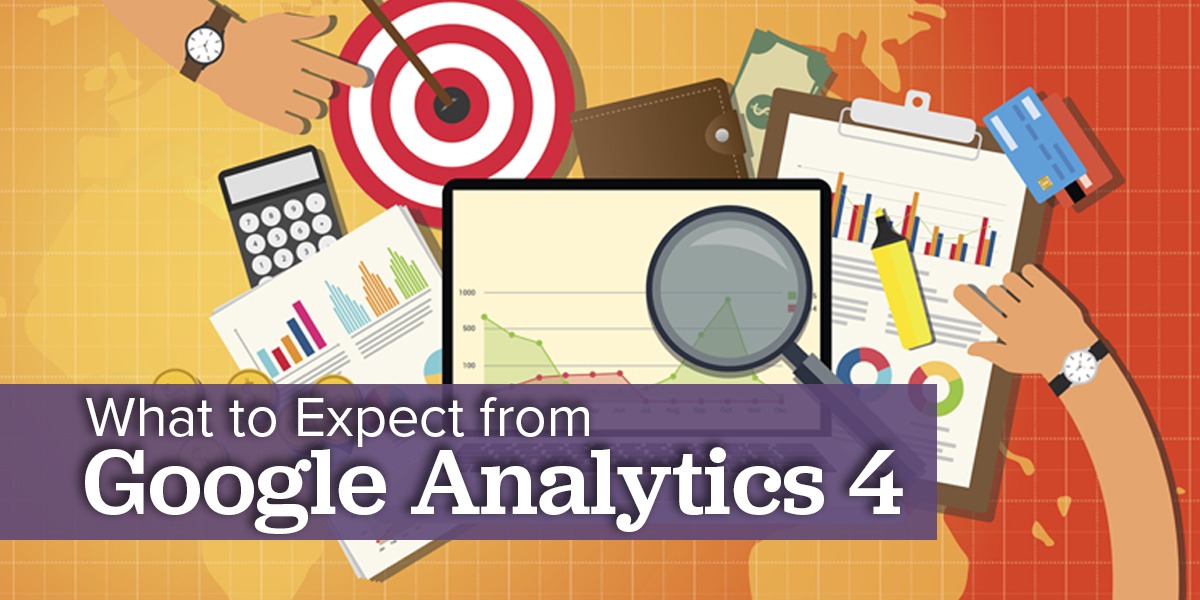Google To Sunset Google Analytics 3: It’s Time to Migrate to Google Analytics 4
Lisa Hirst Carnes | April 2022
 Google Analytics 3, aka Universal Analytics (UA), is poised to take a ride come July 1, 2023. Google is set to deprecate Google Analytics 3 and replace it with Google Analytics 4.
Google Analytics 3, aka Universal Analytics (UA), is poised to take a ride come July 1, 2023. Google is set to deprecate Google Analytics 3 and replace it with Google Analytics 4.
The pending sunsetting of GA3 gives online marketers 15 months to transition their tags and reports to the new framework. Google intends to discard the 10-year-old Google Analytics (UA) into digital nothingness come the deadline. The announcement comes hot on the heels of changing data privacy laws and tracking technology.
Current Situation and Brief History of GA
Google has announced the intention to shelf Universal Analytics in favor of the newer Google Analytics 4. The GA 4 was introduced two years ago to replace UA, which supports online measurements that are rapidly becoming obsolete.
When Did Google Rollout GA?
More than 50 million websites rely on Google Analytics for web analytics, with more online ventures coming on board each year. The software giant first acquired the software in 2005 and has continually updated it to reflect the changing online environment.
- 2005: Google acquired Urchin from Urchin Software Corp and rebranded it “Urchin from Google”.
- 2006: Google acquired Measure Map and redesigned the software
- 2007: Google introduced the Google Analytics synchronous code
- 2009: Google introduced Google Analytics Asynchronous Code
- 2012: Google releases Universal Analytics as a beta for large enterprises.
- 2014: Google released Universal Analytics from beta, and it contained all features from the previous analytics.
- 2016: Google merges all Classic Analytics into Universal Analytics.
- 2017: Google released Global Site Tag to unify and standardize data integration between its services.
- 2020: Google Introduces Google Analytics 4 (GA 4) to help users understand how users interact with their sites and apps. The new framework included a new premium feature, a free BigQuery export functionality.
Why is Google Analytics (reporting) Critical to the Success of Your Organization?
Google Analytics 4 is specially designed to help you achieve your key objectives, such as driving sales, generating leads, and tracking customer engagement. This tool tracks and collects every bit of data you need to make informed business decisions.
- Increased customer engagement: The GA 4 measures a series of events to provide a detailed view of your entire customer lifecycle. The data offers profound insights to help you understand how prospects navigate your sales funnels. That allows you to spot the drop-off points and make the necessary adjustments.
- Data-driven ROI: GA 4 collects a significant amount of data to help you analyze the impact of your entire marketing efforts across a prospect’s journey. You gain a sound understanding of which marketing activities are driving your conversions. You can use the data to optimize and double down your efforts on them and boost revenue.
- Seamless data privacy compliance: GA 4 improves your ability to comply with new data laws. You can customize the user data you collect without compromising key site functionalities.
- Predictive insights: Google Analytics 4 puts the power of machine learning at your fingertips. It allows you to exploit predictive insights such as user behavior, and conversions, and segment your target audience by their purchasing power. It provides insights to help you optimize your marketing efforts.
- Easy integration: GA 4 integrates easily with other Google marketing products to let you take full advantage of your predictive insights. You can then launch highly targeted marketing campaigns through Google Ads to skyrocket your sales.
How is Google Analytics 4 different from UA?
The main difference between Google Analytics 4 and Universal Analytics lies in their measurement models. The UA measurement model leans towards the desktop web, uses independent web sessions, and relies on tracking data from cookies.
In contrast, Google Analytics 4 works across all platforms and isn’t exclusively reliant on cookies. It embodies an event-based measurement model to deliver user-centric data.
While UA offers various privacy controls, they’re hardly sufficient to conform to current data and privacy laws. Meanwhile, GA 4 has privacy baked into its core while improving the user experience.
GA 4 is designed to help businesses meet changing customer needs and expectations while providing granular data collection controls. Unlike UA, Ga 4 won’t store IP addresses. Such controls are necessary to navigate the dynamic international data privacy landscape. Modern-day internet users demand higher privacy protection and control over their private information.
No Monthly Hit Limits
Another significant difference between UA and GA 4 is the scraping of the monthly hit limits. The monthly hit limits in the free version of the Universal Analytics version were capped at 10 million. The new Google Analytics 4 has done away with the traditional limit.
Google Analytics 4 takes a different approach – it limits the number of events that you can capture instead of the volume of the hits. You can capture up to 500 events, and there’s no limit to the volume of hits you can capture. You can now collect all the data you need to grow your online venture with almost no restrictions.
Free BigQuery Connection
The Google Analytics 4 comes with a free connection to BigQuery. Previously, this feature was only available to GA 360, one of Google’s most expensive offerings. Google Analytics 360 service is a $150,000 a year service available in $12,500 monthly subscriptions.
Big Query allows you to query large sets of complex data quickly and efficiently. Sampling is often a challenge when creating complex segments in Google Analytics. Big Query fetches the data from GA, eliminating the sampling problem and making it easy for you to interrogate your data.
Next Steps
Google will stop collecting web analytics data using standard Universal Analytics from July 1, 2023. After the deadline, you can no longer use the AU to track and measure your web analytics since it’ll no longer be processing hits. However, you’ll have unrestricted access to any data previously processed by Universal Analytics for at least six months.
Unfortunately, the Google Analytics (AU) reports will no longer be accessible through the Analytics interface. And the UA data will no longer be accessible through the API.
Google recommends online marketers switch to Google Analytics 4 as quickly as possible. You can export your Universal Analytics data to GA 4 after making the switch. Timely migration ensures that online marketing campaigns run smoothly and uninterrupted.
Need help and not sure where to start? Contact the ArcStone team today!

